Two Zila Parishad school teachers in Dadhare village are introducing novel, experiential ways of learning with their informal school set- up, which has helped create independent thinkers in the tribal region
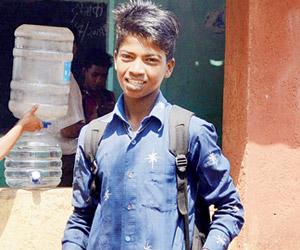
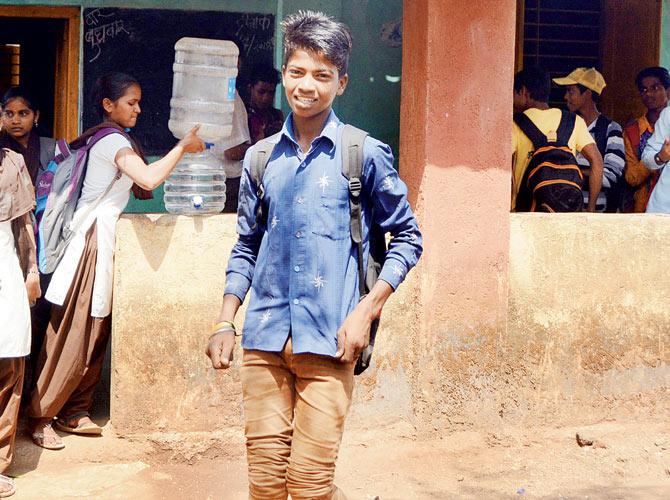
Vidyankur centre at Dadhare village in Wada is currently preparing 34 students for the SSC exams next year
ADVERTISEMENT
April is the cruellest month in Wada taluka of Palghar. The famous opening line of TS Eliot's magnum opus, The Waste Land, comes to mind as one negotiates the gravel roads of the tribal belt. It's 11.45 am, and the only stretch leading to the village of Dadhare, a few kilometres by road from Wada, has been shut for the last three months. Repairs are on, and locals inform that the alternative route to this tiny hamlet is by having the car swim through a pebbled river bed, before hitting a dirt track, where tyres have, more often than not, collapsed.
Pralhad Vitthal Kathole, 39, drives his Swift Dzire through this quagmire daily, as he leaves his home in Dadhare (Palghar) to work at the nearby Zila Parishad School, Baliwali. Only during this month of the year, said to be the hottest and driest in Wada, do ZP schools — they otherwise run from 10 am to 5 pm — begin early in the morning and wrap up before noon. These timings give Pralhad, an assistant teacher at the Baliwali school, enough leg-room to focus on his experimental learning centre, Vidyankur. Set up just a few houses away from his own, it is redefining the education space in the region.
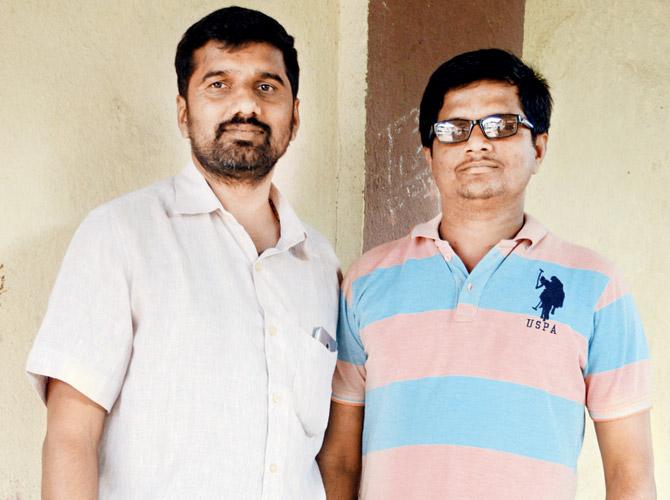
Pralhad (left) and his brother Kishor Kathole are the force behind the learning centre. Pics/Sneha Kharabe
The birth of a school
Five years ago, Pralhad, an educator with a Masters in Elementary Education from the Tata Institute of Social Sciences, had a brainwave. He wanted to help the tribal children from Wada — most of whom were first-time school-goers — tide the barriers that prevented them from completing schooling.
Having been born and brought up in Dadhare, 85 km from Mumbai, he was aware of how lack of access to quality education proved to be a major impediment for villagers, for whom agriculture is the predominant source of income. "While there are some Zila parishad schools in Wada, which run from Std I to VIII, there are only two senior secondary government schools, where children can complete Std X," says Pralhad, adding that both these schools are situated at a distance, and require kids to trudge 13.5 kilometres daily. This has resulted in several of them dropping out.
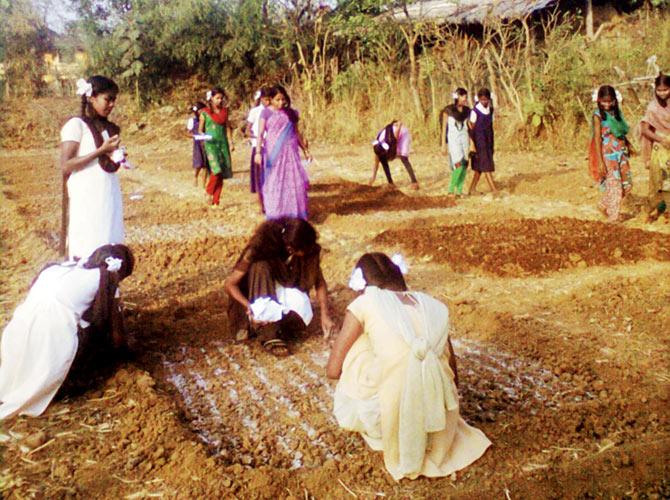
Students are seen applying concepts they have learned in maths and science on a plot of land in Dadhare village, which Vidyankur has rented from a farmer for Rs 10,000 annually
"I was mostly concerned about the young girls from these tribal hamlets. Marriage was the only recourse for them after leaving school," he says, pointing out how early marriage in the region has also been responsible for the alarming number of malnutrition deaths in Palghar. "It's a vicious cycle," he adds.
To counter this, Pralhad started Vidyankur in 2013, which functions out of two defunct ZP school buildings in his village. His motivation for this centre came from a master plan instituted by the state government nearly 10 years ago, where they had shortlisted a few model villages in the region, including Dadhare, where senior secondary schools could be set up.
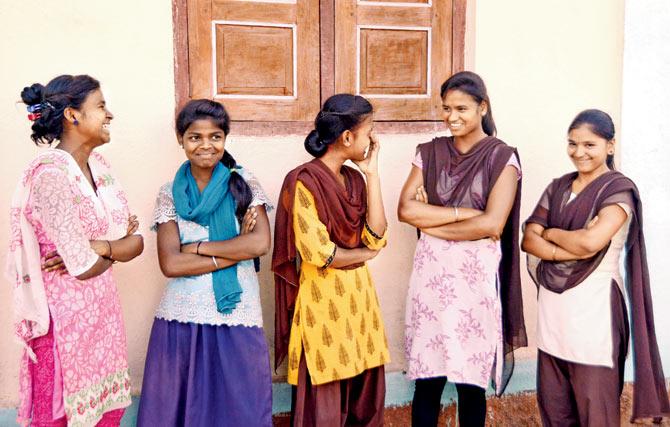
Vidyankur hopes to provide better opportunities for girls in the tribal belt, who marry right after leaving school. Early marriage is also the reason for the alarming number of malnutrition deaths in Palghar
Aware of the potential of such a school, Pralhad started building infrastructure for it, including creating a library of books, for which he invested Rs 10,000. Two kids from the village were asked to help him curate the list. "I wanted them to decide what they wished to read," he says. From Marathi translations of Satyajit Ray's Feluda series, to Arthur Conan Doyle's Sherlock Holmes, and academic books, Pralhad stockpiled almost every kind of book. "But, the government did a U-turn, and scrapped the project," he recalls. Dejected, but not defeated, he went ahead and built upon Vidyankur, creating an informal school from Std VIII to X, which followed the state curriculum, but employed novel ways of learning.
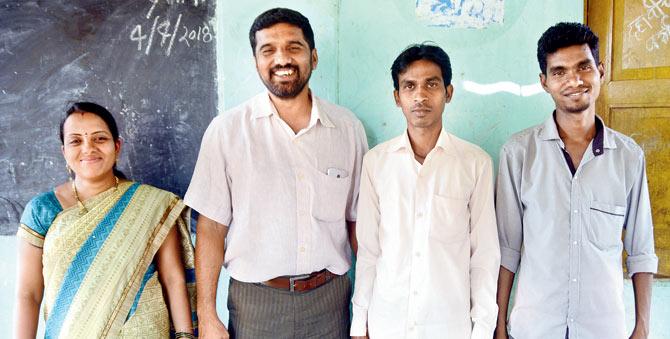
Prahlad with three of the teachers at Vidyankur — Roshana Kathole, Mohan Shanware, and Lavesh Bhoir.
Classroom of experiments
When the sun is not too harsh, the teachers at Vidyankur — Roshana Kathole, Mohan Shanware, Lavesh Bhoir and Sandip Bhoye — take the students out into the field, which Prahlad has rented for Rs 10,000 a year, from a farmer. It's just a stone's throw away from the centre. On the farm, they learn mathematics, alongside biology and chemistry, while teaching the kids how to sow seeds and till the land. "We are only connecting education with the lived reality of the child," explains Pralhad, adding that the "knowledge base of tribal children is more in harmony with nature compared to other groups, including non-tribal rural and urban communities".
Bridging the gap
Prahlad cites the Kothari Commission (1964-1966), which states the importance of integrating practical work with general and vocational education and application of classroom knowledge in secondary education.
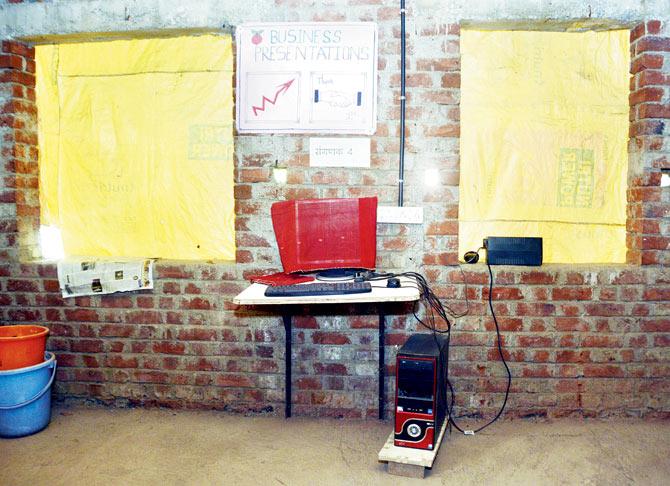
The students are believed to have done all electrical fittings and have made furniture for their computer lab
However, before starting the programme, Prahlad and his teachers had observed that many students, who had joined Vidyankur, lacked basic literacy and numeric skills, despite nearly eight years of elementary education. Without these skills any kind of intervention wouldn't have progressed much, says Prahlad.
To bridge the gap, Prahlad, with the assistance of his brother Kishor Kathole, 35 — who also teaches at the another Zila Parishad School, Kolim Sarovar — started an eight-week remedial programme. Tests developed by Quality Education Support Trust (QUEST), which has its headquarters in Wada, and is helmed by Nilesh Nimkar, were used to identify students' levels and to break them into groups to provide need-based inputs. Following the programme, which takes off at the start of the academic year in June, students are integrated into regular classes.
Prahlad explains the ease with which children understand basic mathematical and scientific concepts if they are combined with farming, fishery, poultry, and even construction and welding.
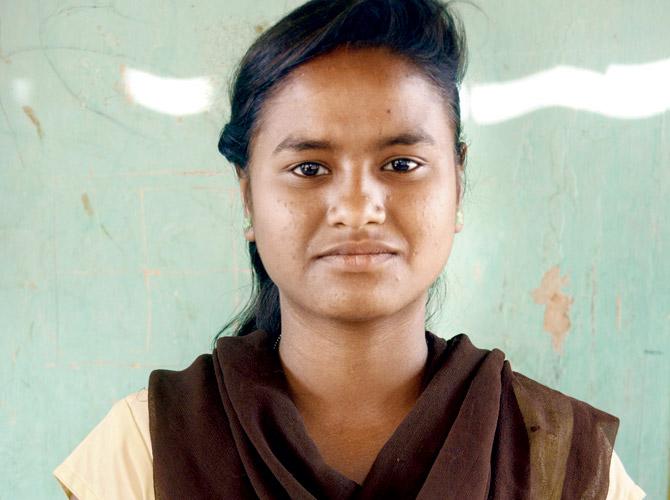
Deepali Vasudev Vakade
Algebra on the field
Eighty per cent of the tribal community migrates for six months in the year to be employed as construction labourers in the city. "We divide the students into groups of three. Before this, they are already taught the Pythagoras theorem. Now, they go to the farming plot, and each group is asked to measure a 2 sqm-area of land, where they will make their bed. What they are basically doing is internalising the knowledge," he says.
"Also, when we distribute the seeds, we show them how to measure the length and breadth of each seed with a vernier caliper and micrometre screw gauge, and ask them to find the average size of the seeds. In this way, the biggest and smallest seeds are taken out, and the average-sized seeds are then sown into the soil bed. They are also taught to identify the soil, measure the exact number of seeds required for the plot and the distance that needs to be kept between seeds, which is actually a concept of density," he adds.
"We keep changing the approaches to teach the subjects," says Prahlad. Every 15 days, Kishor and he sit down with the four teachers and discuss possible solutions to tackle problem areas. "Our aim is to ensure that each student absorbs, understands and articulates what is being taught in the classroom," says Kishor.
Similar integrative approaches are used for other subjects. The students have been taught how to do wiring and carpentry using concepts of physics and geometry, and have surprisingly, done all the electrical fittings and made furniture for their computer laboratory, called Picademy. The lab was launched in August last year, with the help of two volunteers from Madanyu, an outreach programme of Cambridge University, UK. Alumni of the 1992 batch of Raja Shivaji Vidyalaya in Dadar East
purchased four pocket-sized Raspberry Pi, which is a series of small single-board computers developed in the UK, for the laboratory.
The volunteers from Cambridge also trained the students over a period of 10 days.
The road ahead
Ashwini Ravindra Baraf, 15, who lives in the neighbouring village Kolim Sarovar, has aced computers, and is also being nudged to teach other kids. "I want to become a doctor," she says reticently, when we meet her at her home, mortifying her mother, Vandana, who can't fathom the idea of a girl having a job. "Who will pay for her education?" she interrupts.
That currently is the fate of most students, despite all the education they are receiving, says Prahlad's brother Kishor. "On an experimental basis, we hope to soon start an extra year, post Std X, where students will be trained by professionals from the industry, in order to help them find jobs in the mainstream, to supplement farming," says Prahlad.
The fear of whether these students will do well at the SSC exams, has well been put to rest, especially after their consistent record. During the year 2013-2014, the centre had eight students in Std X, out of which six passed the SSC exam. Last year, there were 33 students, and Vidyankur secured 100 per cent results.
One key problem area for the Kathole brothers is funding, but the annual grant of R2 lakh that they receive from the alumni of Raja Shivaji Vidyalaya has helped them stay afloat. "We also need to pay the teachers a fee of Rs 5,000 per month and additionally register our students for the SSC exams," says Prahlad, adding that the registration fee amounts to at least R2,000 per child. The more imminent threat is from the state government, which has sent them multiple notices for running an illegal school. "But, it's just a learning centre for kids," he says.
From what one sees in the classroom, the prospects look bright for Vidyankur. Deepali Vasudev Vakade, 15, who is preparing for next year's SSC exams along with 33 others, reveals how she struggled with basic concepts in maths while at a ZP school in Wada. "I used be afraid to ask the teacher because I thought she would yell at me in front of everyone. Here, the teachers don't go ahead, if everyone has not understood the subject," she says in Marathi. She refuses to talk about her dreams of joining the police force in front of the class, but later, whispers this into her teacher, Roshana's ears. Her friend, Preeti Bhagde, says she wants to become a lavani dancer. Nobody is talking about marriage yet.
Also Read: Maharashtra teachers continue to wait for their February salary
Catch up on all the latest Mumbai news, crime news, current affairs, and also a complete guide on Mumbai from food to things to do and events across the city here. Also download the new mid-day Android and iOS apps to get latest updates
 Subscribe today by clicking the link and stay updated with the latest news!" Click here!
Subscribe today by clicking the link and stay updated with the latest news!" Click here!







